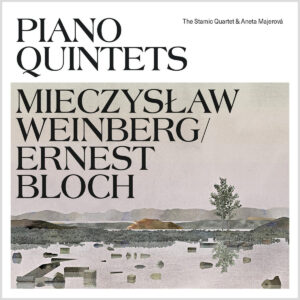For it being one of the absolutely great chamber works of the 20th century, there aren’t actually that many good recordings of the Mieczysław Weinberg Piano Quintet. I have yet to listen to the Attacca Quartet’s and the Silesian String Quartet’s most recent releases, but that caveat considered, there haven’t been any totally convincing renditions since the historic must-have recording of the Borodin Quartet with the composer as the pianist on Melodiya. (Search for it under “Vainberg”!). The ARC Ensemble comes close; the arrangement on the otherwise excellent ECM release with the fervent Weinberg champion Gidon Kremer doesn’t quite catch the work’s spirit. It is on the back of the quintet’s strength that there really isn’t a bad recording of the quintet, either. But here is one that does tick all the boxes!
It’s a 2013 recording taken from the Czech Radio featuring the Stamic Quartet, which is usually found on Supraphon. Thank heavens that Animal Music (a Czech jazz label that seems to be dipping its toes into classical music now) issued it on CD: It’s special. That starts with a strangely involving, wonderfully dark, distant sound, with a dream-from-a-time-bygone feeling. Because Shostakovich and Weinberg’s relationship was close and intertwined at this point (1944), Weinberg is often seen as a miniature Shostakovich, a lesser, darker, grim copy of the famous original. Weinberg contributed to the easy (mis-) perception of a slanted student-teacher relationship by stating that “I am a pupil of Shostakovich. Although I have never had lessons from him, I count myself as his pupil, as his flesh and blood”.
Anyone reading that and listening to the Weinberg Quintet (written when the composer was 24) might be tempted to consider the latter’s work a (strong) copy of Shostakovich. But the influence was mutual, not a one-way street, and if Shostakovich’s own Quintet had a (mild) influence on Weinberg’s, the latter actually had a more notable effect on Shostakovich’s Second Piano Trio and other subsequent works. Admittedly, if you still haven’t jumped on the Weinberg bandwagon, it is helpful to imagine Shostakvich’s language plus influences from Szymanowski and Bartók to arrive at an idea of the Quintet’s style. Add to that some surprise moments like the finale breaking into a Scottish jig.
The Stamic Quartet’s playing is luscious, accurate, and powerful—it doesn’t let the pianist dominate without dominating her. And it doesn’t confuse force and thrust with speed. It’s an interpretation very different from the swifter, more strident take by the composer with the Borodins—it builds strength out of accumulated energy rather than the feverish moment. The approach works exceedingly well—only the circus-polka feeling of the Presto is in more appropriately frenzied hands with the Borodins.
Ernest Bloch’s Second Piano Quintet is another very strong and underrated work, and there are even fewer recordings available than of the Weinberg. The two pieces work extremely well as a coupling. Bloch’s Quintet is a late work and although the Swiss composer was almost 40 years Weinberg’s senior and died 37 years earlier, it’s the more modern work, written shortly before Bloch was diagnosed with cancer from which he died in 1959.
It is very cleverly constructed—concise and academically impressive. Fortunately it sounds nothing like that. Not the least because the Stamic Quartet and Aneta Majerová deliver another forceful, sometimes barreling, more often robustly gripping performance. It comes across like hard-edged but very much sanguineous modern romanticism. The rewarding Hyperion recording with Piers Lane and the Goldner String Quartet has the advantage of being coupled with Bloch’s First Quintet, but otherwise it can’t be said to outclass Stamic/Majerová (this time a 2016 studio recording). And if this disc, with excellent notes, is your introduction to the Bloch Quintets, you will probably seek it out anyway.
































